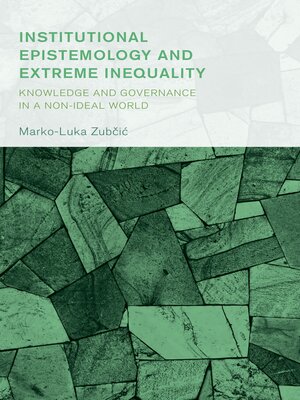Institutional Epistemology and Extreme Inequality
ebook ∣ Knowledge and Governance in a Non-ideal World · Collective Studies in Knowledge and Society
By Marko-Luka Zubcic

Sign up to save your library
With an OverDrive account, you can save your favorite libraries for at-a-glance information about availability. Find out more about OverDrive accounts.
Find this title in Libby, the library reading app by OverDrive.



Search for a digital library with this title
Title found at these libraries:
| Library Name | Distance |
|---|---|
| Loading... |
Institutional Epistemology and Extreme Inequality: Knowledge and Governance in a Non-ideal World provides an account of the fundamental design of an institutional system that can reliably solve problems, learn, and attain knowledge. Reconciling non-ideal system-oriented epistemic democracy and liberalism, Marko-Luka Zubcic develops a unified theory of institutional epistemology. From Deweyan experimentalism and Hayekian epistemic institutionalism to open democracy and pluralist liberalism of New Diversity Theory, Zubcic integrates insights from pragmatism, studies of division of cognitive labor and collective search under complexity, governance studies, and critical social epistemology.
Institutional Epistemology and Extreme Inequality also provides a new, decisive epistemological argument that protection against extreme economic inequalities is a condition of epistemic reliability of an institutional system. Thus, Zubcic shows that—along with constitutional liberties, self-governance, open markets, and polycentricity—freedom from poverty and limits on private wealth are the institutional devices we collectively and individually need to reliably solve difficult problems and attain knowledge.
Institutional Epistemology and Extreme Inequality also provides a new, decisive epistemological argument that protection against extreme economic inequalities is a condition of epistemic reliability of an institutional system. Thus, Zubcic shows that—along with constitutional liberties, self-governance, open markets, and polycentricity—freedom from poverty and limits on private wealth are the institutional devices we collectively and individually need to reliably solve difficult problems and attain knowledge.







